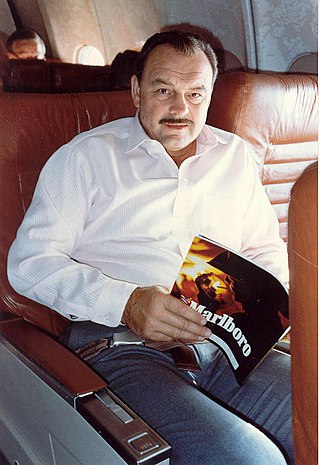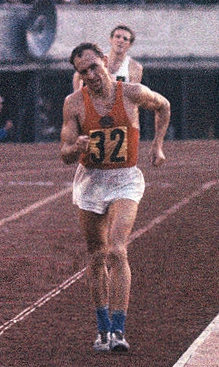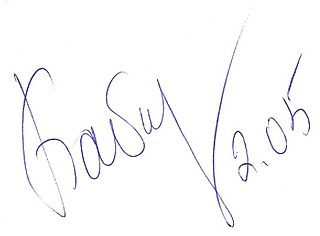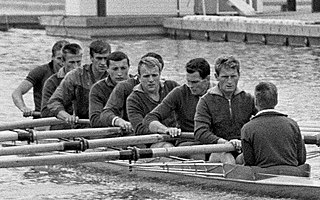
Richard Marvin Butkus was an American professional football linebacker, sports commentator, and actor. He played football for the Chicago Bears of the National Football League (NFL) from 1965 to 1973. He was invited to eight Pro Bowls in nine seasons, named a first-team All-Pro five times, and was twice recognized by his peers as the NFL's Defensive Player of the Year. Butkus was renowned as a fierce tackler and for the relentless effort with which he played. He is widely regarded as one of the greatest and most intimidating linebackers in professional football history.

The 1976 Summer Olympics, officially known as the Games of the XXI Olympiad, were a summer multi-sport event held in Montreal, Quebec, Canada, from July 17 to August 1, 1976. A total of 6,084 athletes from 92 countries represented by National Olympic Committees (NOCs) participated in these Games, competing in 198 events in 23 sports.

The 1976 Winter Olympics, officially known as the XII Olympic Winter Games, was a winter multi-sport event held in Innsbruck, Austria, from 4 to 15 February 1976. A total of 1,123 athletes representing 37 National Olympic Committees (NOC) participated in 37 events from 10 different sports and disciplines. Two events were contested for the first time: the figure skating discipline of ice dancing, and the men's 1,000 metres in speed skating.

The Soviet Union (USSR) competed at the 1976 Summer Olympics in the city of Montreal, Quebec, Canada. 410 competitors, 285 men and 125 women, took part in 189 events in 22 sports. As the country hosted the next Olympics in Moscow, a live video feed from the city was shown at the closing ceremony.

Volodymyr Stepanovych Holubnychy was a Ukrainian race walker, who competed for the Soviet Union. He dominated the 20 kilometre race walk in the 1960s and 1970s, winning four Olympic medals from 1960 to 1972 and finishing seventh in 1976. He became Olympic champion in 1960 and 1968. He is regarded as one of the greatest race walkers of all time and competed at the Olympics on five occasions in 1960, 1964, 1968, 1972 and 1976.
The 1976 Winter Olympic Games cross-country skiing results. The women's 3 × 5 km relay was replaced by a 4 × 5 km relay at these games.

Inha Babakova is a former high jumper who represented the Soviet Union and later Ukraine. She was born in Asgabat, Turkmen SSR. Her personal best is 2.05 metres.

Modestas Paulauskas is a former Lithuanian professional basketball coach and basketball player.

The Soviet Union (USSR) competed at the 1976 Winter Olympics in Innsbruck, Austria.
The water polo tournament at the 1976 Summer Olympics was held from 18 to 27 July 1976 in Montreal, Quebec, Canada.

Irina Nikolayevna Vorobieva was a Russian pair skater who competed for the Soviet Union. With her then-husband Igor Lisovsky, she was the 1981 World champion and the 1981 European champion. They were coached by Tamara Moskvina.

Vytautas Janušaitis is an Olympic medley swimmer from Lithuania, who represented his home country at the 2004, 2008 and 2012 Summer Olympics.

Julius Vytautas Briedis was a Lithuanian rower who specialized in the eight. In this boat class he won three silver medals at the European and world championships of 1962–1964 and finished fifth and third at the 1964 and 1968 Summer Olympics, respectively.
Vladimir Nikolaevich Eshinov was a Russian rower who competed for the Soviet Union in the 1972 Summer Olympics and in the 1976 Summer Olympics.
Mikhail Nikolaevich Kuznetsov is a Russian rower who competed for the Soviet Union in the 1976 Summer Olympics.
Aleksandr Grigorevich Klepikov was a Russian rower who competed for the Soviet Union in the 1976 Summer Olympics.
Aleksandr Viktorovich Lukyanov is a Russian coxswain who competed for the Soviet Union in the 1976 Summer Olympics, in the 1980 Summer Olympics, and in the 1988 Summer Olympics and for Russia in the 1996 Summer Olympics and in the 2000 Summer Olympics.

Vytautas Strolia is a Lithuanian cross-country skier and biathlete.
Vytautas was a Lithuanian medieval king, Grand Duke, Prince of Hrodna and Prince of Lutsk. Tis name has become a popular Lithuanian masculine given name. Vienas populiariausių vardų Lietuvoje. Its Polonized versions are Witowt, however Vytautas the Great is called by the name Witold. Diminutive forms of the name include Vitas,Vytis, Tautas, Tautis, Taučius.










